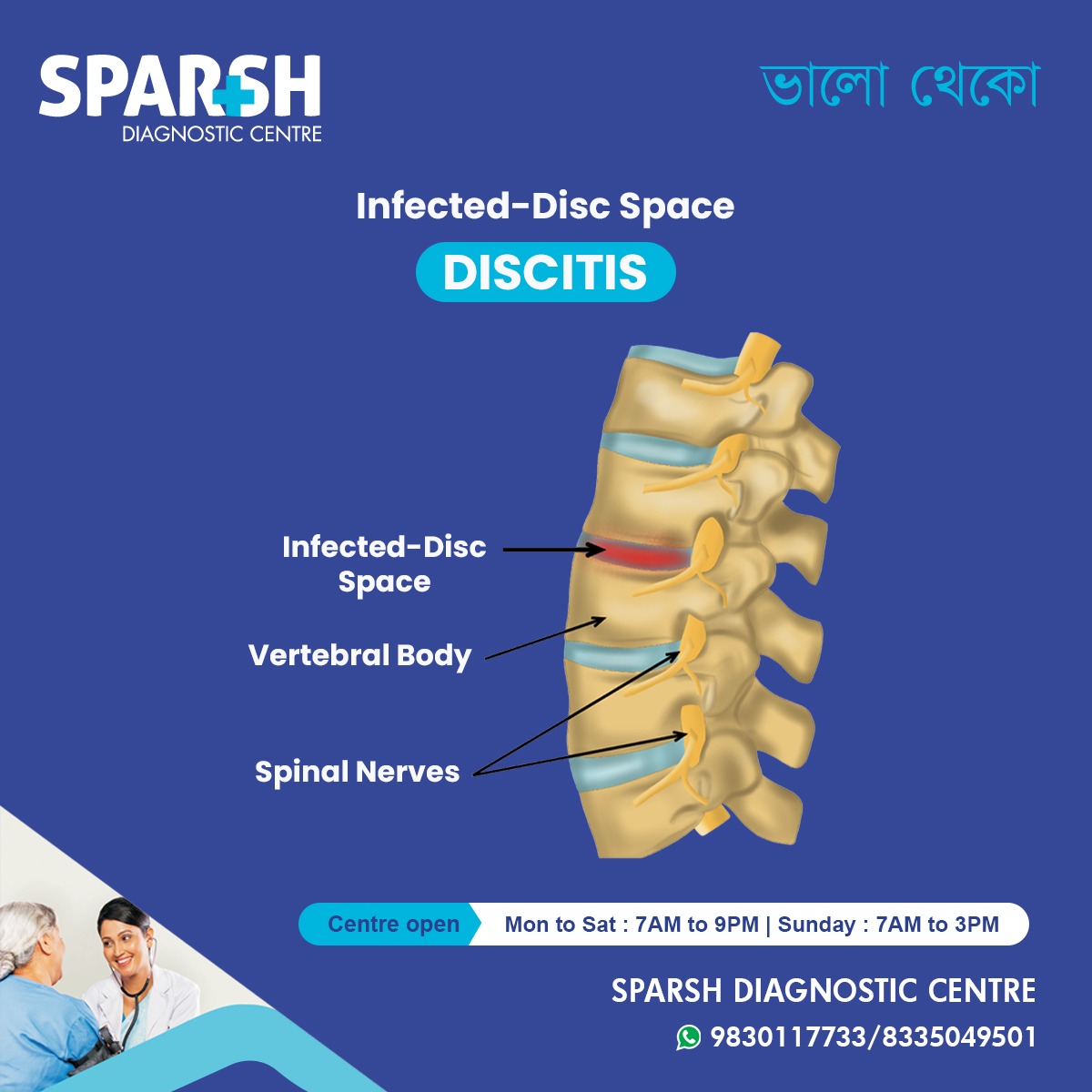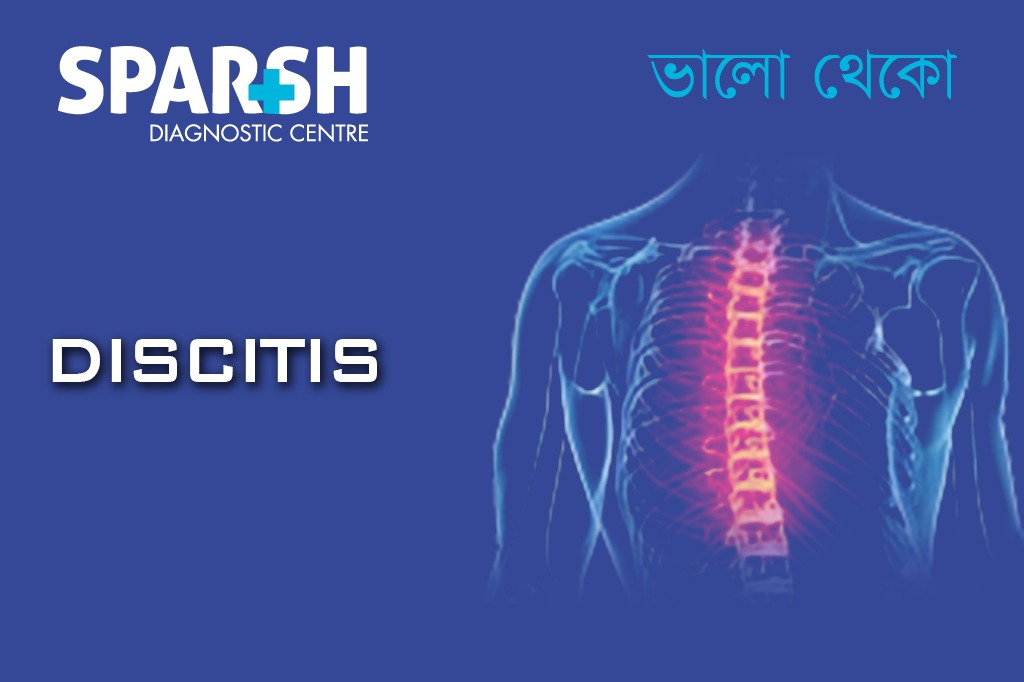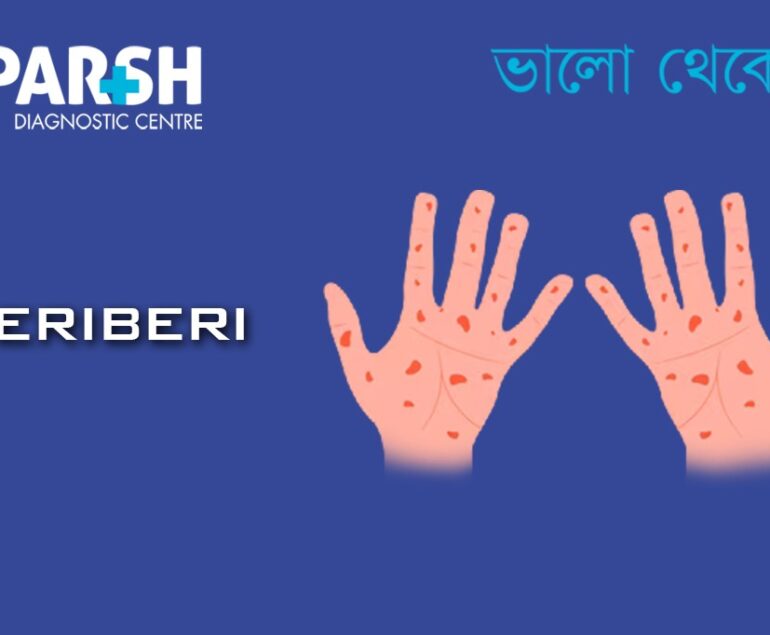Back pain is one of the most common medical complaints across all age groups. However, when the pain is severe, persistent, and accompanied by fever or other systemic symptoms, it may point to something more serious—Discitis.
Discitis is a bacterial or fungal infection of the intervertebral disc space that can cause significant pain and disability if not treated promptly. It often occurs alongside vertebral osteomyelitis (infection of the adjacent vertebral bones). Though rare, discitis requires immediate medical attention and precise diagnostic imaging to prevent long-term complications.
At Sparsh Diagnostic Centre, we use advanced imaging techniques and blood tests to accurately diagnose and monitor cases of discitis.
What Is Discitis?
Discitis refers to the inflammation or infection of the intervertebral disc space, the soft cushion between the vertebrae that allows flexibility and absorbs shock in the spine. The condition is most often caused by bacterial infection, but in some cases, viruses or fungi may be responsible.
When infection sets in, the disc becomes swollen, painful, and less functional. The surrounding vertebrae and spinal structures can also get inflamed, leading to severe pain, stiffness, and neurological symptoms if nerves are compressed.

Types of Discitis
Discitis can be categorized based on its cause:
Infectious Discitis
Caused by bacteria, fungi, or viruses.
The most common organism involved is Staphylococcus aureus.
Can result from a bloodstream infection or after spinal surgery or procedures.
Aseptic (Non-infectious) Discitis
Not caused by infection but by an autoimmune or inflammatory reaction.
Seen in some post-surgical cases or after disc injury.
Causes of Discitis
Discitis often develops when infectious organisms enter the bloodstream and reach the spine. Common causes include:
Hematogenous spread (through the bloodstream) — infections in other body parts, such as urinary tract infections, skin infections, or dental abscesses, can spread to the spinal disc.
Post-surgical infection — after spinal surgery, such as discectomy or spinal fusion.
Direct infection from injury — penetrating trauma or injections near the spine.
Underlying conditions — such as diabetes, weakened immune system, or chronic kidney disease, which increase susceptibility to infection.
Risk Factors
Certain individuals are more prone to developing discitis, including those who:
Have weakened immunity (due to HIV, cancer, or immunosuppressive drugs).
Have undergone recent spinal surgery or epidural injections.
Have a chronic infection elsewhere in the body.
Have diabetes mellitus or intravenous drug use history.
Are elderly or have degenerative spinal diseases.
Symptoms of Discitis
Discitis symptoms can develop gradually or suddenly, depending on the cause and severity of the infection. Common signs and symptoms include:
Stiffness and limited movement in the spine.
Pain radiating to arms or legs, if nerve roots are irritated.
Difficulty walking or sitting for long periods.
In children, refusal to walk or stand and irritability may be early signs.
If left untreated, discitis can progress to epidural abscess, vertebral osteomyelitis, or even neurological complications due to spinal cord compression.
How Discitis Is Diagnosed
Early diagnosis is crucial for effective treatment. A combination of imaging and laboratory investigations are required to confirm discitis.
1. Magnetic Resonance Imaging (MRI)
MRI is the most sensitive test for detecting discitis. It shows inflammation, infection, and any abscess formation in detail.
2. Computed Tomography (CT) Scan
CT scans provide detailed images of bone structures, helping to evaluate damage to vertebral bodies.
3. Blood Tests
Erythrocyte Sedimentation Rate (ESR) and C-Reactive Protein (CRP) levels are elevated in most cases.
Complete Blood Count (CBC) may show elevated white blood cell counts indicating infection.
4. Blood Cultures
To identify the exact bacteria or organism causing the infection.
5. Disc Biopsy
In some cases, a needle biopsy of the infected disc space is performed for culture and sensitivity testing to guide antibiotic therapy.
Treatment of Discitis
The treatment of discitis primarily focuses on eliminating the infection, relieving pain, and restoring spinal function. The management plan depends on the severity of the infection and the patient’s overall health.
1. Antibiotic Therapy
Intravenous (IV) antibiotics are the mainstay of treatment, usually continued for 6–8 weeks.
The antibiotic choice depends on the culture results but often includes drugs effective against Staphylococcus aureus and Streptococcus species.
In fungal infections, antifungal medications may be prescribed.
2. Pain Management
Pain-relieving medications and anti-inflammatory drugs are used to control symptoms.
3. Bed Rest and Immobilization
Patients may be advised to rest and use a back brace to stabilize the spine and promote healing.
4. Physical Therapy
Once the infection subsides, physical therapy helps in regaining spinal flexibility, muscle strength, and posture correction.
5. Surgical Intervention
Surgery is rarely needed but may be required if:
There’s spinal instability or deformity.
An abscess compresses the spinal cord or nerves.
The infection doesn’t respond to antibiotics.
Surgical options include debridement (removal of infected tissue), fusion, or stabilization of the spine.
Recovery and Prognosis
With early diagnosis and appropriate treatment, the prognosis for discitis is generally good. However, recovery may take several weeks to months, depending on the infection’s severity.
Patients are advised to:
Complete their entire antibiotic course.
Avoid heavy lifting and sudden spine movements.
Attend regular follow-ups with imaging tests to monitor healing.
Engage in guided physiotherapy to prevent stiffness and muscle weakness.
Delayed or inadequate treatment may lead to complications such as chronic pain, vertebral collapse, or spinal deformity.
Complications of Discitis
If untreated, discitis can lead to:
Epidural abscess formation (pus around the spinal cord).
Vertebral bone destruction and collapse.
Chronic back pain and deformity.
Neurological deficits, including paralysis, if nerves are compressed.
Prompt medical attention helps prevent these serious outcomes.
Preventing Discitis
While not all cases can be prevented, you can reduce your risk by:
Practicing good hygiene and promptly treating any infections.
Following sterile techniques during spinal procedures.
Managing chronic diseases like diabetes effectively.
Avoiding intravenous drug abuse.
Ensuring proper post-surgical care and early mobilization.
When to See a Doctor
Seek medical help immediately if you experience:
Persistent back pain with fever.
Sudden onset of spinal stiffness after surgery or infection.
Weakness, numbness, or tingling in arms or legs.
Severe fatigue or unexplained weight loss.
At Sparsh Diagnostic Centre, our experts provide prompt evaluation and advanced imaging for early detection of spinal infections like discitis.
Why Choose Sparsh Diagnostic Centre for Discitis Diagnosis
Experienced radiologists specialized in musculoskeletal imaging.
Comprehensive infection workup including blood tests and cultures.
Compassionate care and patient-focused guidance.
Your spine health deserves precision, expertise, and care — all under one roof at Sparsh Diagnostic Centre, Kolkata.
FAQ Section on Discitis
1. What is the most common cause of discitis?
The most common cause is bacterial infection, particularly by Staphylococcus aureus, which can spread from another infection in the body through the bloodstream.
2. How serious is discitis?
Discitis is a serious condition that can lead to chronic pain, spinal deformity, or neurological complications if not treated promptly.
3. Can discitis heal on its own?
No. Discitis requires medical treatment, usually with intravenous antibiotics. Without proper therapy, the infection may worsen or spread.
4. What is the recovery time for discitis?
Most patients recover within 6–12 weeks, but full recovery and spinal healing can take several months depending on the infection severity.
5. Can children get discitis?
Yes. Discitis can occur in children, often presenting as refusal to walk or stand due to pain.
6. Is discitis contagious?
No, discitis is not contagious. It results from an internal infection and cannot spread from person to person.
7. How is discitis confirmed?
It is confirmed through MRI scans, blood tests (like ESR and CRP), and sometimes a disc biopsy for culture and sensitivity.
8. What are the long-term effects of discitis?
If treated early, most people recover fully. In delayed cases, it can cause chronic pain, spinal stiffness, or deformity.
Discitis is a rare yet serious spinal condition that requires early detection and specialized care. Recognizing symptoms such as persistent back pain and fever is crucial for timely intervention. With modern diagnostic tools available at Sparsh Diagnostic Centre, accurate diagnosis and effective treatment are within reach.
If you or someone you know experiences unexplained back pain or recent infection-related symptoms, book an appointment at Sparsh Diagnostic Centre for a thorough evaluation.
Sparsh Diagnostic Centre
📍 231/1 NSC Bose Road, Near Sparsh More, Kolkata 700047
📞 9830117733 / 8335049501
🕒 Mon–Sat: 7 AM–9 PM | Sunday: 7 AM–3 PM
🌐 www.sparshdiagnostica.com
#BhaloTheko
Disclaimer:
No content on this site, regardless of date, should ever be used as a substitute for direct medical advice from your doctor or other qualified clinician.

![]()





